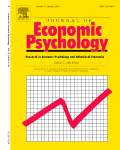
So you want to submit to the Journal of Economic Psychology. Great!
Before you do, though, there are a few things you should consider. Your time is valuable, and we do not want to waste it. And we hope you agree that the editors’ and reviewers’ time is also valuable. You might be able to save some of it by following a few simple steps. By doing so, you will also show that you do value our journal and are familiar with it, and, let’s be honest, that is not unimportant for the evaluation of your paper.
In four upcoming posts, I will elaborate on the steps that, as an Editor in Chief, I would really like authors to follow before submitting. But here is a brief summary already. I will link the step titles to the more detailed posts as I work my way through them (Hint: There is a “Follow” button on the right-hand-side which will warn you of new posts).
Step 1. Is your paper appropriate?
We publish research in economic psychology and behavioral economics, with a very, very strong emphasis on empirical relevance. We publish empirical research articles and brief reports, (content-based) surveys, and book reviews. We do NOT publish narrative discussions, position papers, bibliometric work (see this post on that), purely-theoretical work without empirical analyses or implications, “macro” work were the unit of observation is a nation, country-studies for their own sake, or simulation work without an empirical counterpart. We have nothing against those kinds of work: they are simply out of JoEP’s scope and will typically be desk-rejected. There was already some detail on that in this previous post.
Step 2. The Big Standards: Avoid Deception, Use Incentives, There is No Marginal Significance, Give Us Your Data.
As everybody familiar with the journal knows, we have a few “no gos.” First, significance means 5%, and if you use “p<.10” anywhere, or write two stars for p<.05 in a regression table instead of just one as you should, your paper WILL just be returned to you (or desk-rejected), full stop. And you will probably have wasted a few weeks. Second, we are very keen on incentivized designs for economic decisions (surprise!), and if you submit a paper on an experiment (or even a survey) that used flat fees for decisions that could and should have been incentivized, you will most likely be desk-rejected. Third, we do generally enforce the no-deception rule of experimental economics: if you lied to your participants in any way, explicit or implicit, you are going to need a very, very good argument as to why that was utterly unavoidable and of the utmost importance (a more detailed post on what is and what is not deception is in the works). Fourth, publication will be conditional on your data being made publicly available, so if you are not able to do so, we will most likely decline to handle your paper (for data from organized surveys and institutional datasets, readers should just be able to access the data following whatever steps are appropriate).
Step 3. Read the Guide for Authors (and other materials).
We put quite a bit of work on the Guide for Authors. If you are asking editors and reviewers to invest their time in reading your paper, and with all due respect, the least you can do is reciprocate and invest your time in reading the Guide for Authors before submitting. All policies described there are enforced! There is truly nothing you can ignore. Also, when you do submit, you are asked to confirm that you have conformed to a number of conventions and policies. Clicking “yes” when the truth is “no” is not going to go down well with us. Sorry! If the answer for any submission check is “no,” please interrupt the submission process, edit your manuscript, and then (and only then) continue. Thanks! Besides the Guide for Authors, it is also a good idea to read our most-recent Editorial, and to peruse other posts in this blog, as this one.
Step 4. Triple check! Triple check! Triple check!
Do not self-sabotage your hard work by rushing the submission. It is very sad to see interesting papers fall victim to lack of attention in the final steps. A manuscript full of typos, or an improperly-formatted appendix, or a set of tables and figures collected at the end (which is against our policies: see the Guide for Authors), create a poor first impression. As a courtesy to reviewers, we try hard not to send any paper out for refereeing unless it is in a highly-polished state. So, whenever you think you are ready to submit… don’t. Really, don’t. I mean it. Let the paper rest for a couple of days and then triple-check it. Which we really mean literally: check three times. If your work is important, please send us the signal that you care enough about it to carefully revise it before sending it to us. Thanks!
